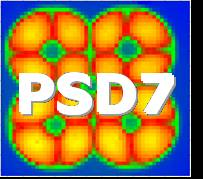Speaker
Prof.
R.Ferreira Marques
(Laboratório de Instrumentação e Física Experimental de Partículas , Portugal)
Description
Timing Resistive Plate Chambers (tRPCs) are planar gaseous detectors
made with resistive electrodes, accurately spaced, that define very
thin gas gaps. Such detectors are known to provide timing accuracies
around 50 ps sigma for minimum ionizing particles.
In practice, the counting rate capability of RPCs is strongly
conditioned by the availability of suitable resistive materials for
the electrodes. For many applications of tRPCs, e.g., time-of-flight
measurements in heavy-ion high-energy physics, the extension of the
counting rate capabilities achievable with glass electrodes, around
2 kHz/cm2, to much higher values is of fundamental importance.
To address this issue we developed 9 cm2 single-gap tRPCs with
electrodes made from metal and from a commercially available ceramic
material with a measured resistivity of 109 •cm and free of charge-
depletion effects.
Time resolution tests were performed irradiating with simultaneous
511 keV photons from the annihilation of positrons emitted by 22Na.
The time resolution remains essentially unchanged, at around 90 ps
, up to 20 kHz/cm2 without any visible rate-induced efficiency loss.
Previous experience with timing RPCs, tested both in particle beams
and with annihilation photons, has shown that, while single-gap
counters may reach a time resolution close to 50 ps in particle
beams, similar counters irradiated with 511 keV simultaneous photons
reach only about 90 ps . Such behaviour may be attributed to the
different characteristics of the primary charge distributions
resulting from each irradiation method.
The present result establishes the practical feasibility of accurate
timing measurements with RPCs at rates up to 20 kHz/cm2, while
keeping a time resolution below 100 ps .
Primary author
Prof.
R.Ferreira Marques
(Laboratório de Instrumentação e Física Experimental de Partículas , Portugal)
